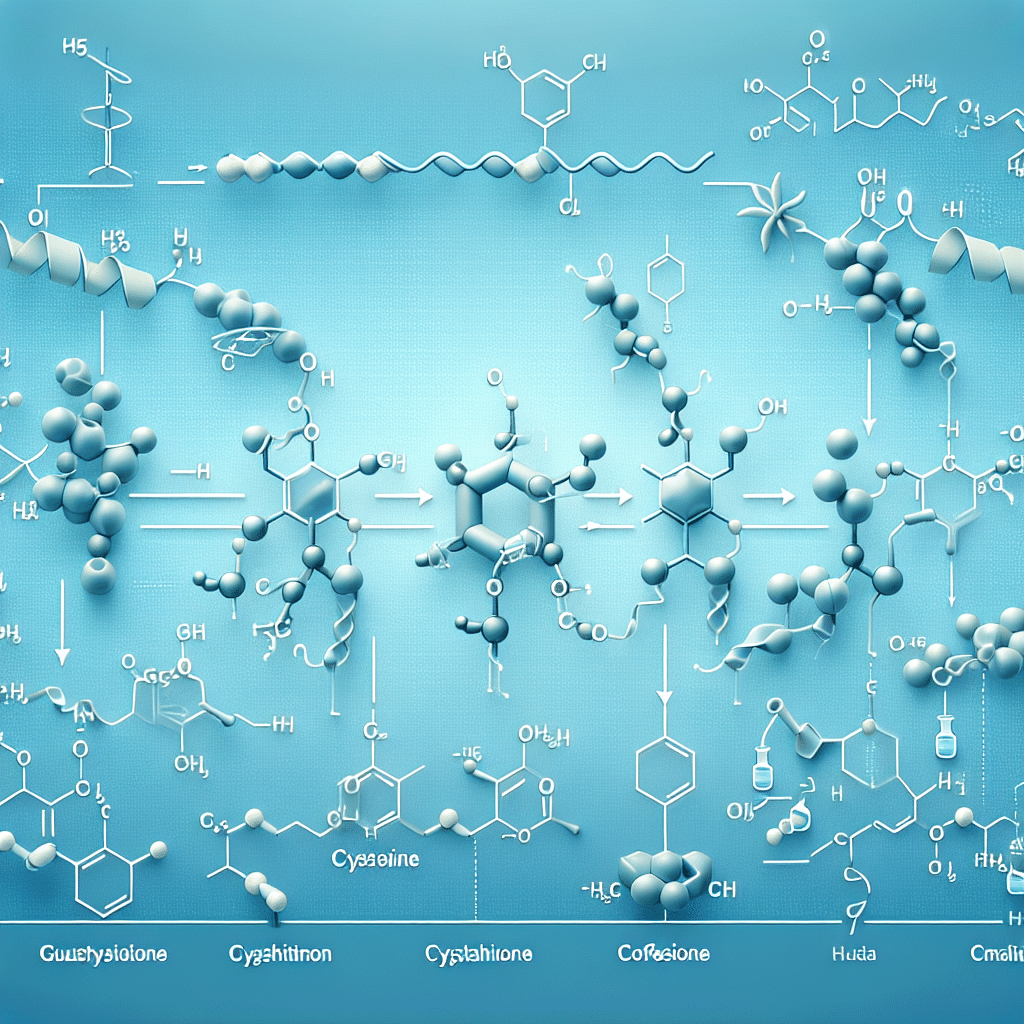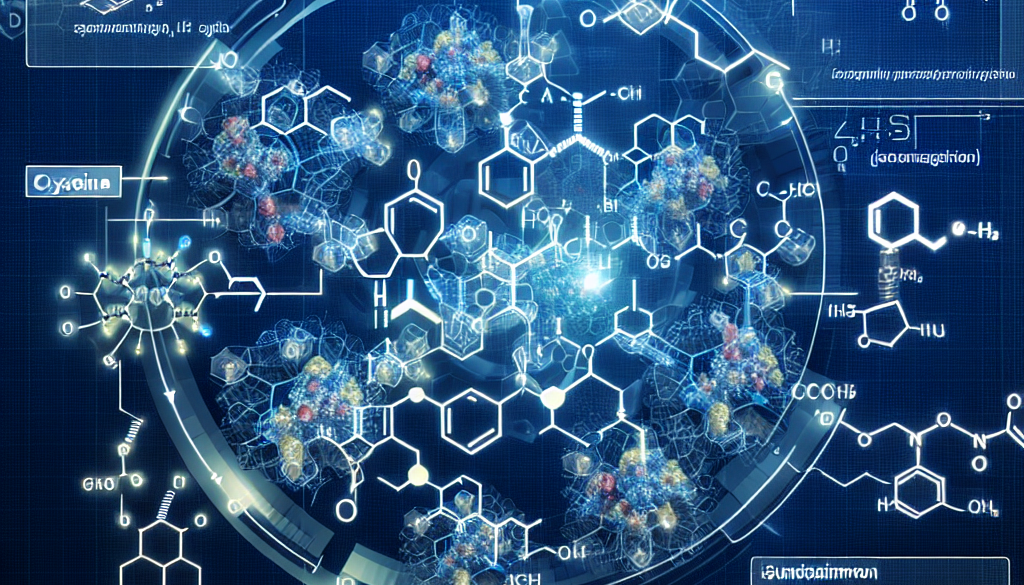Cysteine Production of Glutathione NCBI: Insights
-
Table of Contents
- Glutathione Production and Cysteine: NCBI Insights and Implications
- The Role of Cysteine in Glutathione Synthesis
- Factors Affecting Cysteine Availability
- Health Implications of Glutathione and Cysteine
- Strategies to Enhance Cysteine and Glutathione Levels
- Research and Case Studies
- NCBI Insights on Cysteine and Glutathione
- Conclusion: The Importance of Cysteine in Glutathione Production
- ETprotein: Your Source for High-Quality Protein Products
Glutathione Production and Cysteine: NCBI Insights and Implications

Glutathione, often referred to as the “master antioxidant,” is a tripeptide composed of three amino acids: glutamine, glycine, and cysteine. It plays a crucial role in cellular protection, detoxification, and the maintenance of the immune system. The synthesis of glutathione is heavily reliant on the availability of its constituent amino acids, particularly cysteine. This article delves into the significance of cysteine in glutathione production, drawing insights from the National Center for Biotechnology Information (NCBI) and other scientific sources.
The Role of Cysteine in Glutathione Synthesis
Glutathione synthesis occurs in two ATP-dependent steps, with cysteine being the rate-limiting factor. The first step involves the formation of gamma-glutamylcysteine from glutamate and cysteine, catalyzed by the enzyme glutamate-cysteine ligase (GCL). The second step is the addition of glycine to gamma-glutamylcysteine, catalyzed by glutathione synthetase, to form glutathione.
- Rate-Limiting Step: The availability of cysteine is critical for the first step, making it the bottleneck for glutathione production.
- Enzymatic Control: The activity of GCL is tightly regulated, ensuring that glutathione synthesis corresponds to the cell’s needs and the availability of cysteine.
Factors Affecting Cysteine Availability
Cysteine availability can be influenced by diet, metabolism, and cellular transport mechanisms. Dietary sources of cysteine include high-protein foods such as meat, eggs, and dairy products. Additionally, the body can synthesize cysteine from the essential amino acid methionine through the transsulfuration pathway.
- Dietary Intake: Consuming sufficient amounts of cysteine-rich foods or supplements can support glutathione synthesis.
- Metabolic Pathways: The body’s ability to convert methionine to cysteine can affect intracellular cysteine levels.
- Cellular Transport: The efficiency of cysteine transport into cells is another factor that can impact glutathione production.
Health Implications of Glutathione and Cysteine
Glutathione is involved in numerous physiological processes, including the neutralization of reactive oxygen species (ROS), the regulation of cell proliferation and apoptosis, and the detoxification of xenobiotics. Adequate levels of glutathione are associated with improved health outcomes, while deficiencies are linked to various diseases.
- Antioxidant Defense: Glutathione protects cells from oxidative stress, which can lead to chronic diseases such as cancer and cardiovascular disorders.
- Immune Function: Glutathione supports the immune system by enhancing the function of lymphocytes and acting as a cofactor for several immune-related enzymes.
- Detoxification: Glutathione conjugates with toxins, facilitating their excretion from the body.
Strategies to Enhance Cysteine and Glutathione Levels
Several strategies can be employed to boost cysteine and glutathione levels, including dietary modifications, supplementation, and lifestyle changes.
- Dietary Modifications: Increasing the intake of cysteine-rich foods or foods that promote cysteine synthesis can be beneficial.
- Supplementation: N-acetylcysteine (NAC) is a commonly used supplement that serves as a precursor to cysteine and glutathione.
- Lifestyle Changes: Reducing exposure to toxins, managing stress, and engaging in regular exercise can help maintain optimal glutathione levels.
Research and Case Studies
Several studies have highlighted the importance of cysteine and glutathione in health and disease. For instance, research has shown that NAC supplementation can improve glutathione levels and reduce oxidative stress in patients with chronic conditions such as chronic obstructive pulmonary disease (COPD) and HIV.
- Chronic Conditions: Patients with chronic diseases often exhibit reduced glutathione levels, and supplementation can have therapeutic effects.
- Aging: Aging is associated with a decline in glutathione levels, and cysteine supplementation may help mitigate age-related oxidative damage.
NCBI Insights on Cysteine and Glutathione
The NCBI database provides a wealth of information on the biochemistry of cysteine and glutathione, as well as their implications for health. It includes numerous peer-reviewed articles and studies that explore the mechanisms of glutathione synthesis and the role of cysteine in various physiological processes.
- Genetic Factors: NCBI resources discuss genetic variations that can affect GCL activity and, consequently, glutathione synthesis.
- Pharmacological Interventions: The database contains information on drugs and compounds that can modulate cysteine and glutathione levels.
Conclusion: The Importance of Cysteine in Glutathione Production
In conclusion, cysteine is a critical component in the synthesis of glutathione, a molecule essential for maintaining cellular health and preventing disease. Understanding the factors that influence cysteine availability and glutathione production can lead to better health outcomes through targeted dietary and lifestyle interventions. NCBI resources provide valuable insights into the complex interplay between cysteine, glutathione, and overall health.
ETprotein: Your Source for High-Quality Protein Products
If you’re looking to enhance your health with protein supplements that support cysteine and glutathione levels, ETprotein offers a range of products to meet your needs. Their high-quality, organic protein powders are an excellent addition to any health-conscious individual’s diet.
About ETprotein:
ETprotein, a reputable protein and L-(+)-Ergothioneine (EGT) Chinese factory manufacturer and supplier, is renowned for producing, stocking, exporting, and delivering the highest quality organic bulk vegan proteins and L-(+)-Ergothioneine. They include Organic rice protein, clear rice protein, pea protein, clear pea protein, watermelon seed protein, pumpkin seed protein, sunflower seed protein, mung bean protein, peanut protein, and L-(+)-Ergothioneine EGT Pharmaceutical grade, L-(+)-Ergothioneine EGT food grade, L-(+)-Ergothioneine EGT cosmetic grade, L-(+)-Ergothioneine EGT reference grade and L-(+)-Ergothioneine EGT standard. Their offerings, characterized by a neutral taste, non-GMO, allergen-free attributes, with L-(+)-Ergothioneine purity over 98%, 99%, cater to a diverse range of industries. They serve nutraceutical, pharmaceutical, cosmeceutical, veterinary, as well as food and beverage finished product distributors, traders, and manufacturers across Europe, USA, Canada, Australia, Thailand, Japan, Korea, Brazil, and Chile, among others.
ETprotein specialization includes exporting and delivering tailor-made protein powder and finished nutritional supplements. Their extensive product range covers sectors like Food and Beverage, Sports Nutrition, Weight Management, Dietary Supplements, Health and Wellness Products, and Infant Formula, ensuring comprehensive solutions to meet all your protein needs.
As a trusted company by leading global food and beverage brands and Fortune 500 companies, ETprotein reinforces China’s reputation in the global arena. For more information or to sample their products, please contact them and email sales(at)ETprotein.com today.














